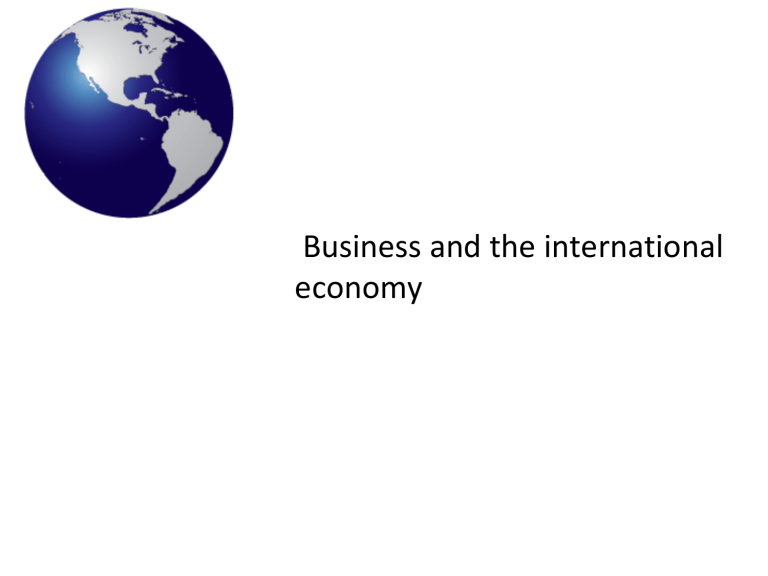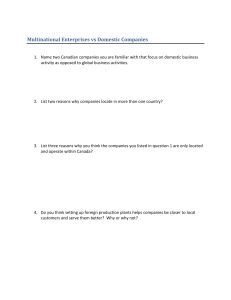
Business and the international economy THE IMPORTANCE OF GLOBALISATION Learning objectives • The concept of globalisation and the reasons for it • Opportunities and threats of globalisation for businesses • Why some governments might introduce import tariffs and quotas Globalisation what is it, and why is it important? Whilst watching this video see if you can explain what international trade means. Remember the key terms. Why is international trade important? Globalisation is the process by which the world is becoming increasingly interconnected as a result of massively increased trade and cultural exchange. Globalisation has increased the production of goods and services. The biggest companies are no longer national firms but multinational corporations with subsidiaries in many countries. Expand upon the points below… Globalisation has resulted in: • increased international trade • a company operating in more than one country • greater dependence on the global economy • freer movement of capital, goods, and services • recognition of companies such as McDonalds and Starbucks in LEDCs What influenced it? • Improvements in transportation – larger cargo ships mean that the cost of transporting goods between countries has decreased. Economies of scale mean the cost per item can reduce when operating on a larger scale. Transport improvements also mean that goods and people can travel more quickly. • Freedom of trade – organisations like the World Trade Organisation (WTO) promote free trade between countries, which help to remove barriers between countries. • Improvements of communications – the internet and mobile technology has allowed greater communication between people in different countries. • Labour availability and skills – countries such as India have lower labour costs (about a third of that of the UK) and also high skill levels. Labour intensive industries such as clothing can take advantage of cheaper labour costs and reduced legal restrictions in LEDCs. Factors attracting companies to a country may include: • cheap raw materials • cheap labour supply • good transport • access to markets where the goods are sold • friendly government policies Imports and exports quiz Imports and exports quiz Paired activity Opportunities and threats of globalisation for businesses In your pair, one person needs to take the opportunities stance and their partner will counter their argument. Another pair will take the threats stance and their partner will counter their argument. Remember to link your arguments as you would for an examination question. Individual activity Complete the opportunities and threats activity. Match the positive and negative impacts with the example opportunity or threat. These points could be used in an exam Barriers to free trade • Tariffs • Subsidies • Quotas • Embargos In pairs, define each of these terms Identify the pros and cons of using trade barriers. Arguments for trade barriers • Protect small businesses and new industries • Prevent dumping • Prevent over-specialisation by protecting a range of different industries Arguments against trade barriers • Restrict consumer choice • Limit opportunities for new businesses and business growth • Protect inefficient domestic businesses with higher costs and often lower-quality products • Other countries will retaliate by introducing their own trade barriers Think, Pair, Share….. Complete the Import protection worksheet Compare your answers with your partner Share your answers with the rest of the group. 6.3.2 REASONS FOR THE IMPORTANCE AND GROWTH OF MULTINATIONAL COMPANIES (MNCS) Learning objectives • Benefits to a business of becoming a multinational • Potential benefits to a country and/or economy where a MNC is located, e.g. jobs, exports, increased choice, investment • Potential drawbacks to a country and/or economy where a MNC is located, e.g. reduced sales of local businesses, repatriation of profits What is a multinational company? • Is a business that has operations in more than one country. • Not sufficient for a company to export and sell its products abroad for it to be multinational. • Must have production, sales or other facilities in more than one country. Reasons for becoming a multinational company Cut costs Improve customer service Attract new staff multinational Increase sales Maximise profits Global market Increase efficiency Paired work Discuss the potential answers with your partner Complete the Multinational worksheet individually. This activity should develop your analytical skills. The advantages and disadvantages of multinationals have been identified, you must explain these points.





